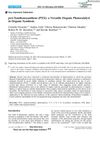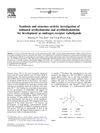 December 2011 in “Drug Research”
December 2011 in “Drug Research” The document shows the state of pharmaceutical patents as of 1999, focusing on treatments for various diseases.
 December 2020 in “Skin appendage disorders”
December 2020 in “Skin appendage disorders” A young man with an unusual type of scarring hair loss suggests a possible new variant of a known scalp condition.
[object Object]  8 citations,
October 1989 in “International Journal of Dermatology”
8 citations,
October 1989 in “International Journal of Dermatology” Cytochrome P-450 enzymes in the skin help break down various substances and could be targeted to treat skin conditions.
 11 citations,
April 2021 in “Advanced synthesis & catalysis”
11 citations,
April 2021 in “Advanced synthesis & catalysis” PXX is an effective and affordable photocatalyst for creating new chemical bonds in organic synthesis.
Toxins can disrupt skin stem cell balance, causing skin overgrowth or ulceration.
 13 citations,
September 2012 in “Critical Reviews in Food Science and Nutrition”
13 citations,
September 2012 in “Critical Reviews in Food Science and Nutrition” Wheat straw is valuable for its health benefits and various industrial uses.
 14 citations,
August 2009 in “Cancer epidemiology”
14 citations,
August 2009 in “Cancer epidemiology” AHCC reduces hair loss and liver injury caused by chemotherapy in rodents.
 8 citations,
January 2013 in “Medicinal chemistry”
8 citations,
January 2013 in “Medicinal chemistry” The compound 4c showed strong potential as an anticancer agent.
9 citations,
April 1970 in “Biochemical pharmacology” Stilbamidine and hydroxystilbamidine inhibit enzyme release from lysosomes and have effects similar to cortisol and chloroquine.
 83 citations,
July 2008 in “Current Opinion in Chemical Biology”
83 citations,
July 2008 in “Current Opinion in Chemical Biology” The document concludes that understanding sulfation biology is crucial for creating treatments due to its importance in biological functions and disease.
 6 citations,
November 2004 in “Bioorganic & Medicinal Chemistry Letters”
6 citations,
November 2004 in “Bioorganic & Medicinal Chemistry Letters” Scientists created iodinated arylhydantoins and arylthiohydantoins that could potentially be used for imaging prostate cancer. Some versions with specific side-chains showed high potential for this use.
 23 citations,
May 2019 in “Expert Opinion on Therapeutic Patents”
23 citations,
May 2019 in “Expert Opinion on Therapeutic Patents” New androgen receptor modulators show promise for treating diseases like prostate cancer and muscle wasting.
 20 citations,
April 2014 in “Dermatologic Therapy”
20 citations,
April 2014 in “Dermatologic Therapy” Sulfotransferase in hair follicles helps predict how well minoxidil works for female hair loss.
 January 2024 in “Molecules (Basel. Online)”
January 2024 in “Molecules (Basel. Online)” Juglone from walnut extracts may help repair damaged hair.
 123 citations,
December 2015 in “Journal of Neuroendocrinology”
123 citations,
December 2015 in “Journal of Neuroendocrinology” New targets for making and using brain-synthesized steroids could lead to better treatments for brain disorders and alcoholism.
December 2022 in “International Journal of Molecular Sciences” Afatinib, neratinib, and zanubrutinib could be effective against KRASG12C-mutant tumors.
 17 citations,
August 2002 in “Dermatologic Surgery”
17 citations,
August 2002 in “Dermatologic Surgery” Fluridil safely promotes hair growth in men with androgenetic alopecia.
 91 citations,
May 2005 in “The Journal of Clinical Endocrinology & Metabolism”
91 citations,
May 2005 in “The Journal of Clinical Endocrinology & Metabolism” A new mutation in the human glucocorticoid receptor reduces its function and causes resistance to glucocorticoids.
 20 citations,
February 2002 in “Expert Opinion on Therapeutic Patents”
20 citations,
February 2002 in “Expert Opinion on Therapeutic Patents” New research is needed to create better drugs that block the enzyme responsible for conditions like male baldness and prostate enlargement.
 3 citations,
January 2001 in “Cambridge University Press eBooks”
3 citations,
January 2001 in “Cambridge University Press eBooks” Finasteride effectively treats hair loss and enlarged prostate in men, with mild side effects.
 22 citations,
January 2008 in “Physiological Research”
22 citations,
January 2008 in “Physiological Research” Steroid sulfatase is important for activating hormones that affect memory, brain function, and certain diseases, and could be a target for treating hormone-related disorders.
 5 citations,
December 2011 in “Drug Research”
5 citations,
December 2011 in “Drug Research” CB-03-01 is a promising skin cream for treating hormone-related skin problems without causing harmful body-wide effects.
 26 citations,
October 2011 in “International Journal of Biological Macromolecules”
26 citations,
October 2011 in “International Journal of Biological Macromolecules” Some newly made compounds are promising for treating enlarged prostate, hair loss, viruses, and prostate cancer, and might be better than current drugs.
 14 citations,
November 2006 in “Current Medicinal Chemistry”
14 citations,
November 2006 in “Current Medicinal Chemistry” New treatments for enlarged prostate are being developed to be more effective and have fewer side effects.
 11 citations,
August 2009 in “Expert Opinion on Drug Discovery”
11 citations,
August 2009 in “Expert Opinion on Drug Discovery” We need better ways to test and understand SARMs to make safer and more effective treatments.
 37 citations,
October 2006 in “Steroids”
37 citations,
October 2006 in “Steroids” New sulfur-containing steroid analogs show promise for more targeted medical treatments.
[object Object]  August 2002 in “Dermatologic Surgery”
August 2002 in “Dermatologic Surgery” Fluridil safely promotes hair growth in men with androgenetic alopecia.
 51 citations,
May 2013 in “The Journal of Steroid Biochemistry and Molecular Biology”
51 citations,
May 2013 in “The Journal of Steroid Biochemistry and Molecular Biology” Certain drugs that block specific enzymes can help treat prostate diseases.
 13 citations,
October 2002 in “Journal of Biochemical and Biophysical Methods”
13 citations,
October 2002 in “Journal of Biochemical and Biophysical Methods” Men with male-pattern baldness have higher levels of certain testosterone metabolites and may have more active androgen metabolism.
 16 citations,
March 2000 in “Clinical Biochemistry”
16 citations,
March 2000 in “Clinical Biochemistry” Women with hair loss had higher levels of certain hormones, suggesting a link to a condition like PCOS.



























